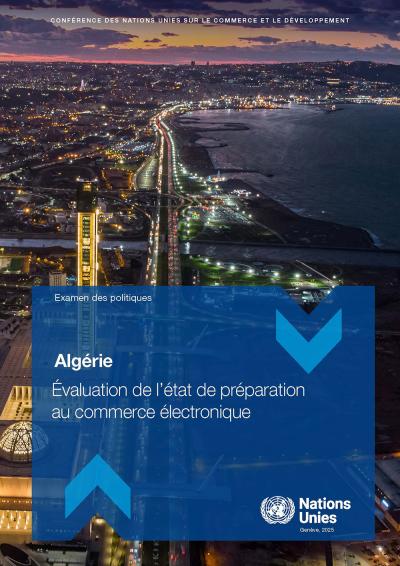Algeria: eTrade Readiness Assessment

The eTrade Readiness Assessment (eT Ready) of Algeria is the fortieth assessment conducted by UNCTAD and the twenty-first in Africa. It provides an in-depth review of Algeria’s e-commerce ecosystem and offers key policy recommendations to build a more enabling environment for e-commerce in line with the country’s economic diversification objective.
The main findings are summarized below by policy area:
- Algeria’s e-commerce sector has witnessed rapid growth mainly in services, driven by expanding information and communications technology (ICT) services and improved Internet access. The number of registered e-commerce businesses has grown at an average annual rate of 92 per cent since 2020, while online payment transactions for goods and services tripled between 2020 and 2024. However, most e-commerce activity remains domestically focused, and payments for goods still represent a small share of total transactions (0.8 per cent). UNCTAD estimates that business to consumer (B2C) e-commerce sales accounted for 0.8 per cent of gross domestic product (GDP) in 2023, indicating significant growth potential. Developing a comprehensive national e-commerce strategy would help provide a clear vision and enhance inter-institutional coordination, laying the foundation for a dynamic and competitive e-commerce sector.
- Algeria benefits from a solid ICT infrastructure that supports the development of e-commerce. Internet usage reached 76.9 per cent in 2023, with mobile phone and mobile Internet penetration rates of 112 and 104 per cent, respectively. Mobile broadband coverage (3G and 4G) extends to over 98 per cent of the population. Subscriptions to fiber-to-the-home (FTTH) services rose from 2 per cent in 2020 to 23 per cent in mid-2024. Combined with relatively affordable mobile Internet—ranked the second most affordable in Africa—these indicators point to significant digital transformation progress. Nonetheless, fixed Internet remains slightly more expensive than the global average.
- Improved last-mile delivery services have helped enhance consumer confidence in online shopping. The country has introduced measures to streamline trade and customs procedures for cross-border e-commerce. However, the sector has yet to reach its full potential. The expected launch of a national single-window trade platform should further simplify and digitalize trade formalities. Algeria’s accession to the African Continental Free Trade Area (AfCFTA) Protocol on Digital Trade represents major opportunities for Algerian start-ups to expand into regional markets. Formalizing last-mile delivery providers and enforcing compliance with regulations would also contribute to more reliable and efficient services.
- Access to financial and payment services has improved, supported by a growing number of bank and postal accounts and nearly 20 million interbank cards in circulation by the end of 2024. However, cash continues to dominate the e-commerce landscape, with around 90 per cent of online transactions paid in cash on delivery. Although electronic payments have grown at an annual rate of 87 per cent over five years, the use of cards for cash withdrawals remains prevalent, which points to a need for further financial inclusion. The recent launch of a mobile payment switch, enabling interoperability, will help diversify digital payment options.
- Algeria has established the foundations of a digital legal framework through legislation on e-commerce, cybercrime, electronic signatures and certification, postal and electronic communications, and personal data protection. A cybersecurity law is currently being drafted. A broader digital law, which will cover aspects of the digital economy, is also under development. The revision of the current e-commerce law to align with United Nations Commission on International Trade Law (UNCITRAL) model laws is seen as a priority to ensure a sound e-commerce legal framework. Online consumer protection is currently governed by general consumer protection laws, in the absence of specific legislation on cyber consumer protection. Further efforts to stimulate the demand for electronic signature and certification services remain necessary.
- E-commerce and digital economy training programmes are expanding across Algeria. Enhancing alignment between training initiatives and private sector needs would help develop the digital and financial skills required by e-commerce operators. Key competencies needed by e-commerce operators include digital marketing, cybersecurity, cross-border e-commerce processes, and personal data management. Support for start-ups in areas such as intellectual property is essential for scaling up and internationalization. Entrepreneurial support initiatives targeting youth and women also offer opportunities to strengthen digital participation and inclusion.
- Access to finance remains a major challenge for digital start-ups. Efforts have been made to diversify financing tools, particularly for start-ups and innovative projects. The launch of Algeria’s first dedicated startup investment fund in 2021 has supported 105 ventures and invested 1.1 billion Algerian Dinar by September 2023, with e-commerce companies representing 16 per cent of labeled start-ups and women-led start-ups accounting for 15 per cent of beneficiaries. The introduction of equity-based crowdfunding in 2023 provides an alternative financing mechanism for high-impact and innovative projects.
The policy recommendations outlined in the eTrade Readiness Assessment of Algeria aim to support the government’s digital transformation agenda and foster a more inclusive and dynamic digital economy.
This assessment was made possible through the financial support of the Deutsche Gesellschaft für Internationale Zusammenarbeit (GIZ) GmbH and the E-commerce and Digital Economy Programme Core Donors (Australia, Switzerland, Sweden, and the Netherlands).


